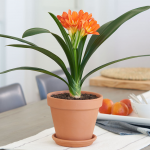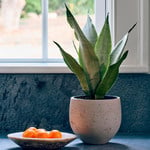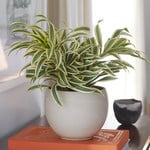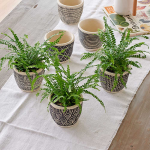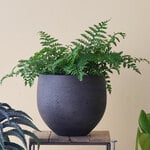Product Details
A bold spiral resembling a snail shell patterns each leaf of this easy-care Rex Begonia 'Escargot.' Rendered in rich bands of pewter, chocolate, and green, it creates an effect that will draw your eye from across the room. Pale pink flowers are an added pleasure. Makes a stunning houseplant. Grow in bright, indirect light with ample humidity and evenly warm room temperatures. Sent in a 8½" wide x 6½" tall handmade clay Farnham pot with matching saucer.
For more information on growing and care, click Growing Guide.
Shipping
WEATHER PERMITTING - Working with Mother Nature
In our business, we work closely with Mother Nature. In the colder months when we stipulate that an item is shipped “weather permitting”, that means temperatures outside our shipping facility in northwestern Connecticut and along the shipping route must be warm enough for tender plants to survive in unheated delivery trucks. Our practice of waiting for windows of milder weather may result in the occasional delay, but our customers tend to appreciate the care we take to make certain their plants arrive in the very best possible condition. Questions? Don’t hesitate to call our customer service staff at 1-800-411-6159.HOW PLANTS ARE SHIPPED
The size of the plants we ship has been selected to reduce the shock of transplanting. For some, this means a large, bareroot crown. Others cannot travel bareroot or transplant best if grown in containers. We ship these perennials and annuals in 1 pint pots, except as noted. We must point out that many perennials will not bloom the first year after planting, but will the following year, amply rewarding your patience. We ship bulbs as dormant, bare bulbs, sometimes with some wood shavings or moss. Shrubs, Roses, vines, and other woody plants may be shipped bareroot or in pots. The size of the pot is noted in the quick facts for each item.
WHEN WE SHIP
We ship our bulbs and plants at the right time for planting in your area, except as noted, with orders dispatched on a first-come, first-served basis by climate zone. We also ship a wide range of containers and planters, tools, supplies, fertilizers, garden wear, garden decor items, as well as indoor decorations like wreaths and dried bouquets when available. Estimated dates for shipping are indicated in the green Shipping Details box for each item. Please supply a street address for delivery. Kindly contact us with two weeks notice, if you'll be away at the expected time of delivery.
OUR GUARANTEE
We guarantee to ship plants that are in prime condition for growing. If your order is damaged or fails to meet your expectations, we will cheerfully replace or refund it. Please contact our Customer Service Department at 1-800-503-9624 or email us at [email protected]. Please include your order number or customer number when contacting us.
Reviews
Average Customer Rating:
 (2 Reviews)
Write a Review
(2 Reviews)
Write a Review
Sort by:
Such a beautiful plant 
A viewer from Maryland
7 of 7 people found this review helpful. Do you? yes no Certified buyer
Breathtaking plant 
A viewer from Centennial, CO
Growing guide
Latin Name Pronunciation: beg-own'ee-uh
Aptly named, these "kings" of the Begonia tribe display gorgeous foliage in wildly variable patterns, colors (including metallic silver), and even shapes (such as the spiral variety called 'Escargot'). Rex Begonias grow from a modified stem structure called a rhizome and are rather exacting in their requirements, but will reward your efforts with a stunning display. Popular as houseplants, Rex Begonias are ideal on a shaded deck or patio, and can light up a shady nook with their striking colors. Flowers are generally insignificant as the brilliant foliage is the main attraction.
Light/Watering: Proper light levels will help bring out the best colors of Rex Begonias. Plants should never see direct sunlight and do well only in bright but filtered light. If light comes mainly from one direction, give each plant a quarter turn every week. The surface of the soil should be allowed to become almost dry between watering during active growth and you must be sure to avoid overwatering. Water with tepid water, not cold water, as it may shock the plants. As days shorten and temperatures drop, plants may enter dormancy—growth stops and leaves may drop. At this time, water only sparingly until new leaves emerge in late winter. Rex Begonias thrive only with high humidity. Dry air will cause the leaf edges to become crisp and dry and plants will languish. Run a humidifier, or simply place potted plants on trays filled with gravel and add water just below top of gravel—do NOT let pots sit in water at any time.
Temperature: Hardy only in zones 10 to 12, Rex Begonias are treated as annuals or as houseplants in colder areas. Moderate daytime temperatures of 65–70°F and nights around 60°F are best. Sudden temperature changes may cause leaves to drop.
Fertilizer/Soil and pH: Fertilize every two weeks beginning in spring when new growth appears with a balanced fertilizer with a 15-30-15 ratio, such as our All Bloom Fertilizer. Taper off feeding in late summer or early fall, and stop in winter, resuming again in spring. A light, free-draining soil high in organic matter is preferred.
Pests/Diseases: Occasionally mealy bugs may appear as cottony white bumps tucked into leaf joints or along the rhizome. Use cotton swabs dipped in rubbing alcohol to wipe off bugs, or spray with insecticidal soap. Two fungal diseases, powdery mildew and botrytis, may occur; good air circulation is essential. Remove dead or diseased leaves promptly as well as any debris on the surface of the planting mix. Good grooming goes far as a preventative, but a systemic fungicide like Funginex may be used if needed.
Companions: Lovely grouped inside or out with other plants that prefer indirect light.
Repotting: Move into larger but shallow pots as required, ideally in spring as new growth begins. Take this opportunity to pinch back tips. If the rhizome has grown over the pot edge, cut it back also, which will force new growth along the rhizome.
Calendar of Care - Rex Begonia
Early Spring: As new growth begins, resume feeding with a balanced houseplant fertilizer with a ratio of 15-20-15, such as our All Bloom Fertilizer. Repot if needed, using a light, free-draining soil mix rich in organic matter. These plants are shallow rooted, so shallow pots are best. Pinch tips back and trim off the rhizome if it has grown over the pot edge. If plants have been moved to a higher light area for the winter, move them back to their summer spots before the sun becomes too bright.
Mid-Spring: After the danger of frost has passed, plants may be moved outdoors to a shady nook or sheltered patio. Be sure to acclimate them slowly to the new conditions to avoid leaf-drop.
Summer: Continue fertilizing and monitor light levels to avoid burning tender leaves. Continue to scout for insect pests and fungal problems.
Fall: Move plants back into house or greenhouse as temperatures fall below 60°F at night. Quarantine plants until you are certain they harbor no insect pests or fungal diseases. Stop fertilizing.
Early Winter: As the days shorten and temperatures drop, plants may enter dormancy. If this happens, water only sparingly until new growth appears in spring.
For information on planting and care of annuals, click here.

